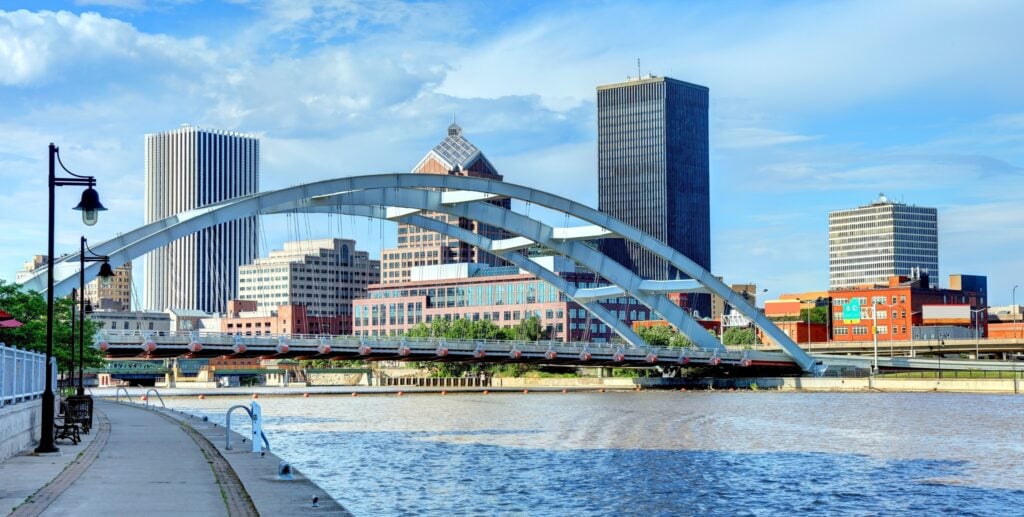
Much of the pandemic-era hotspots have cooled down, namely in Florida. Now, the Northeast is showing strong price appreciation, along with several Midwestern markets that have consistently been the more affordable places to invest in. As we move into 2025, below is a quick look at how prices are looking across the country according to data we pulled from last month.
Florida’s West Coast Takes a Hit
The sun isn’t shining as brightly as it once was in the Sunshine State—at least not for property owners. After years of rampant home price increases, some of Florida’s booming cities have experienced steep declines in home prices. Data from the National Association of Realtors (NAR) shows that Florida’s West Coast metro areas have been hit particularly hard.
Punta Gorda and the surrounding area have seen a 6.5% price drop over the last quarter, bringing down the median to $350,000, the biggest decline since 2011. The once-booming North Port-Sarasota-Bradenton area has dropped 5.8%, pulling the median down to $485,000. Cape Coral-Fort Myers is also down—by 3.7%, on top of earlier declines in the year.
NAR chief economist Lawrence Yun told Bloomberg that the Southeast, in general, is suffering from a trifecta of economic factors: “more inventory, higher insurance costs, and more homebuilding in recent years.”
Tony Barrett, president of the Realtor Association of Sarasota and Manatee, feels that extreme weather in recent months also didn’t help, delaying sales and hurting homebuyer confidence. With increased homebuilding and buyers becoming skittish, particularly in the wake of hurricanes Helene and Milton this fall—the latter storm made landfall just outside Sarasota, taking lives and destroying homes across the state—Florida needs to rebuild emotionally as well as physically.
However, other areas of the Sunbelt have suffered from falling prices due to the aforementioned issues. San Antonio-New Braunfels, Texas, and Durham-Chapel Hill, North Carolina, have all seen year-over-year price drops after huge gains of over 20% in the wake of the pandemic. Despite this, housing is still considerably more expensive than before the pandemic and above the price range of most homebuyers.
The Midwest and Northeast Boast Huge Gains
The Midwest, which has been reliably affordable for many years, has boasted huge gains in home prices. National Association of Realtors (NAR) data shows that the fastest-paced growth was in Racine, Wisconsin, where home prices rose 13.7% from a year earlier, and the Youngstown-Warren-Boardman, Ohio area, where prices climbed 13.1%.
Both metro areas are relatively affordable, with the median home price in Racine at $310,200 in the third quarter. In Youngstown, it was $171,100.
The NAR data showed that Illinois had four cities posting double-digit gains:
Several lower-priced Northeastern cities posted sizeable gains: Syracuse, New York (13%) and Norwich-New London, Connecticut (10.6%).
Data from GOBankingRates.com showed several others:
Smaller Northeastern cities have been hot for a while due to their relatively low prices compared to more expensive surrounding cities, such as Boston and New York, and the influx of new residents and jobs.
The recent gains in the Northeast might be a reaction to the migration of residents to warmer Sunbelt states during the pandemic. This has slowed since the pandemic has waned, with companies calling more people back to the office.
Tech Investment Boosts Northeast Housing Prices and Job Market
One of the biggest drivers of jobs and housing in the Northeast is tech, specifically the billions of dollars the Biden administration has been pumping into U.S. chipmakers to shift the lucrative business away from China. The government just announced an $825 million investment in a new semiconductor research and development facility in Albany, New York. Zillow shows Albany’s house prices are currently up by 6.7% year over year.
Syracuse Prepares for an Economic Hurricane
Nearby, Syracuse is readying itself for a dramatic transformation. In October 2022, Micron Technology, one of the world’s largest semiconductor makers, unveiled plans to build a $100 billion factory complex in the Syracuse area and hire tens of thousands of workers. Plans for new transportation links and housing are already underway.
A flurry of new businesses has also opened in the area. Local officials estimate the Micron facility would require 40,000 more residences to accommodate the expected population increase, about 10,000 of those within the next three years. According to CoStar data, as of November, the average rent for a one-bedroom apartment in Syracuse is $1,156 per month, 26% lower than the national average.
“There’s more demand for home sales than we’ve ever seen in my lifetime” spreading from Clay south to Syracuse,” Christopher Savage, director of sales at Cushman & Wakefield/Pyramid Brokerage, told CoStar News.
The Micron project is so large that it will affect housing in Syracuse and surrounding areas in upstate New York.
“We want some economic growth,” Joe Driscoll, an I-81 project director (the Interstate 81 viaduct is being raised to accommodate new development) for the city of Syracuse and former city council member, told CoStar News. “We want to see mixed-use development, we want to see coffee shops, we want to see restaurants, we want to see retail, but with that balance of affordable housing, too. I don’t think a lot of people realize what a $100 billion investment will look like. There’s a hurricane coming.”
Why Investing in the Northeast and Midwest Makes Sense
According to Warren Buffett’s BusinessWire, a Berkshire Hathaway company, the Northeast and Midwest dominate the top housing markets for 2025, with projected appreciation ranging from 6.3% to 7.7%. The website states:
“These regions offer a blend of strong economies and relatively affordable housing, attracting buyers. Notably, two Pennsylvania cities (Lancaster, Reading); Rochester (NY); Manchester (NH); and six Midwestern metros (Akron & Mansfield, OH; Rockford, IL; Grand Rapids, MI; Topeka, KS; Lafayette, IN) lead the pack.”
It’s worth noting that the forecast is only for 2025 and does not factor in the tech boom that will hit upstate New York cities over several years.
Final Thoughts
You could be forgiven for being confused by housing data in recent years. Immediately after the pandemic, everyone raved about the Sunbelt and predicted the demise of towns and cities in the Northeast as remote workers decamped for warm weather and cheaper housing. Now, companies are demanding a return to work, and it seems the Northeast is hot again.
The reality is that most of the U.S. enjoyed appreciation in 2024, with home prices increasing nationally year over year by 3.4% as of September. There are fluctuations in every market, and investors who invest for equity appreciation take a careful look at the economies in each town and city, their affordability, the new developments and businesses heading their way, and current inventory.
While Florida and the Sunbelt might have taken a dip recently, it will be temporary as inventory and current house prices recalibrate. The new businesses that have relocated there will remain. However, the scale of investment in some Northeastern cities indicates that the upward house price trajectory could continue for a while.
Find the Hottest Markets of 2024!
Effortlessly discover your next investment hotspot with the brand new BiggerPockets Market Finder, featuring detailed metrics and insights for all U.S. markets.

Note By BiggerPockets: These are opinions written by the author and do not necessarily represent the opinions of BiggerPockets.






